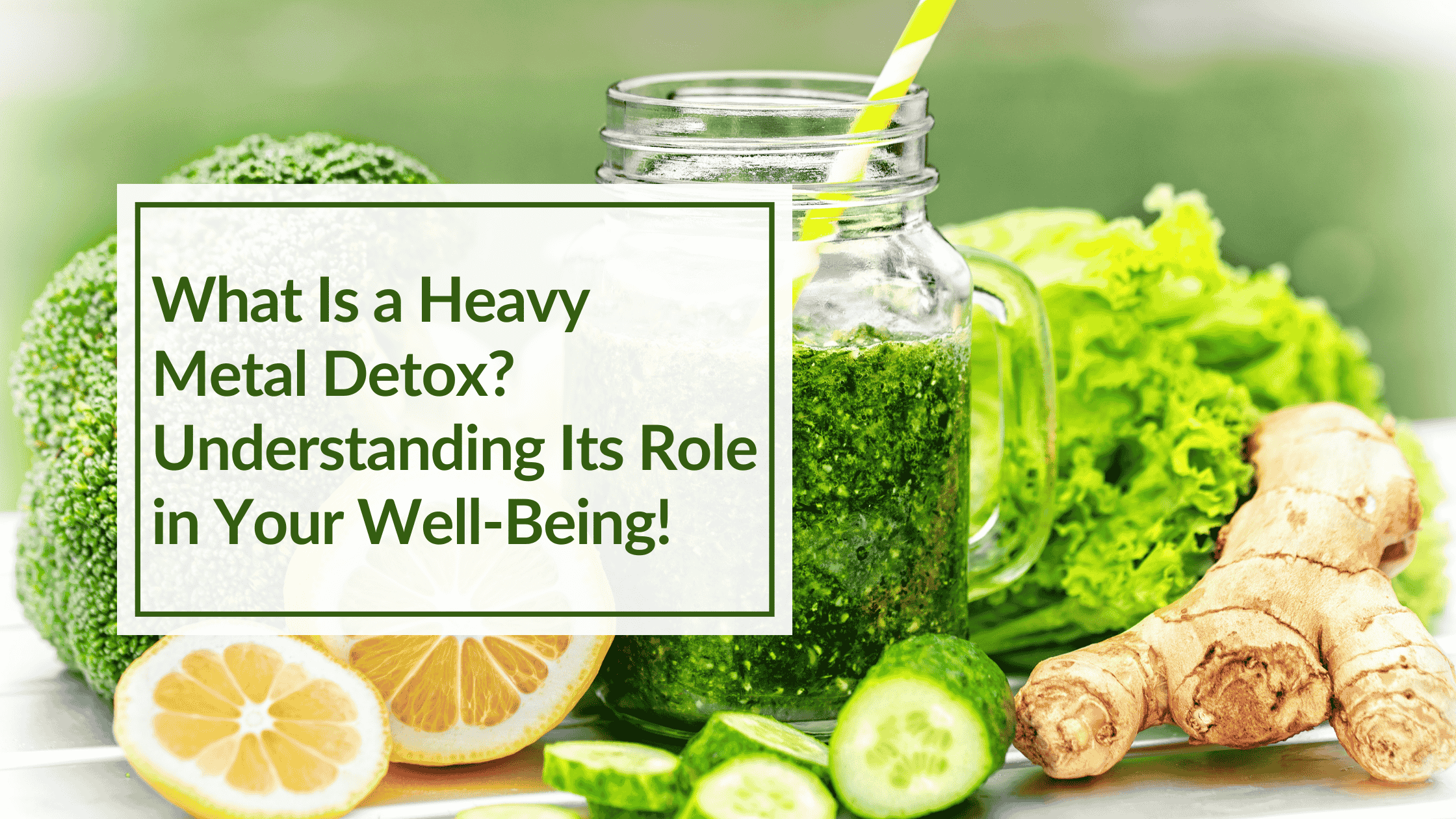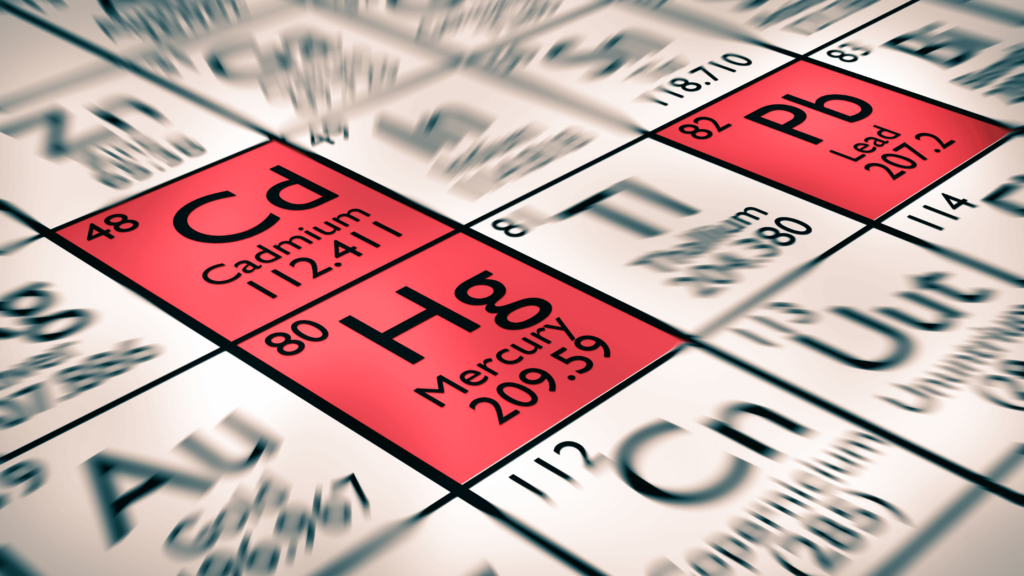
What Is a Heavy Metal Detox, and Do You Need One?
Your brain’s feeling sluggish, you’re exhausted, and you’re bloated. Sound familiar? You may need a heavy metal detox! Now, what is a heavy metal detox, you ask?!
Nope, it’s not a rock band on tour—it’s your body calling for a cleanse! A heavy metal detox involves exactly what it might sound like: cleansing heavy metal toxins like mercury, lead, arsenic, and cadmium, which can accumulate in your body over time.
If you’ve felt sluggish, foggy, or just “off,” heavy metals might be sneaking into your system, and your body is trying to let you know.
In this blog, we’ll explain the effects of heavy metals in the body, why they can throw your health off balance, and how to help your body detox naturally. Keep reading for everything you need to know about heavy metal detox!

What Are Heavy Metal Toxins?
Heavy metals are naturally occurring elements found in the earth’s crust. While they’re everywhere, the effects of heavy metals in the body can be harmful when they accumulate beyond what our bodies can safely process.
We are exposed to environmental and heavy metal toxins daily—more than we often realize.
You might already be familiar with some of these heavy metals:
- Mercury
- Lead
- Arsenic
- Cadmium
The National Institutes of Health (NIH) has recognized several of these metals as hazardous and linked them to various health risks, including neurological damage, kidney failure, and cardiovascular issues.
Where Are The Heavy Metals Coming From?
Heavy metals can enter our bodies through various sources!
Food and Water: Pesticides, fertilizers, and industrial runoff can introduce heavy metals like arsenic and cadmium into our food and drinking water. Farm-raised fish often carry mercury due to polluted oceans.
Dental Fillings: Amalgam, or silver fillings, can slowly release mercury into your body over time.
Air Pollution: Factories, mining, cigarette smoke, and vehicle exhaust release heavy metals that settle on crops, soil, and water, leading to exposure through inhalation and ingestion.
Household Products: Heavy metals hide in everyday items like cleaning supplies, makeup, deodorant, cookware, deodorants, old paints, ceramics, and batteries.
Tattoos: can also introduce metals like mercury, lead, and cadmium.
Work and Industrial Settings: Professions like construction and manufacturing expose workers to higher levels of heavy metals, especially without protective gear.
From Birth: Heavy metals can be passed from mother to child in utero, meaning some exposure starts before we’re even born.
Our bodies can handle small amounts, but with modern life increasing exposure, metals can accumulate faster than our natural detox systems can process. That’s where a heavy metal detox can help!
Does Your Body Need Help Detoxing?
Before we explain exactly what is a heavy metal detox, there is some debate in the health and wellness community over whether the body even needs help detoxing. Some say your body has all the natural detox tools it needs—why bother with a detox? Others argue that modern toxins overload our system and can outpace our body’s natural defenses.
Who’s right? Well, your body can detox heavy metals, but it usually needs extra support.
At CBH Energetics, our bioenergetic hair and saliva testing tests for energetic toxins that can add stress to your body. We scan for 6 different types of toxins, including heavy metals!
Disclaimer: Please note we do not diagnose or treat health conditions with bioenergetics. However, we support the body in returning to balance with bioenergetic testing, which can show organ and system stress as well as the presence of energetic toxins.
So, while yes, your body can detoxify, a lot goes into it, and we have seen firsthand with hundreds of individuals just how often toxins can impact health.
Factors like poor diet, stress, pathogens, and environmental exposure can limit your natural detox capacity. When that happens, the heavy metals sit in our cells with nowhere to go.

How Do Heavy Metals Impact Your Wellness? What Are the Signs?
The effects of heavy metals in the body can vary, but here are some key systems they can affect:
Nervous System: Cognitive and Mood Issues
Heavy metals like lead and mercury are notorious neurotoxins that can block normal communication between neurons, leaving your brain foggy and weakened by emotional regulation.
- Brain fog, difficulty concentrating, poor memory, and learning challenges.
- Mood issues such as depression and anxiety.
- Tremors, impaired motor control, and, in severe cases, dementia.
- Impaired hearing, speech, vision, and gait.
Immune System: Weakening Your Defenses
Heavy metals like cadmium and arsenic can weaken your Immune System, making it harder for your body to fight off bugs and regulate inflammation.
- Chronic inflammation leading to persistent joint pain or autoimmune flare-ups.
- Frequent infections and poor recovery from physical activity.
Digestive System: Gut Inflammation and Nutrient Deficiency
Heavy metals can wreak havoc on your digestive system, leading to gut inflammation and other imbalances.
- Digestive issues, including irritable bowel syndrome (IBS), bloating, constipation, and diarrhea.
- Skin irritation as toxins try to escape through the skin when digestion is disrupted.
- Nutrient malabsorption—leaving you deficient in essential vitamins and minerals.
Cardiovascular System: Heart and Blood Health
Heavy metals can accumulate in your Cardiovascular System, leading to problems with your heart and blood.
- Anemia causing fatigue and weakness due to reduced red blood cell production.
- Higher risk of heart attacks and cardiovascular issues.
Locomotor System: Chronic Pain and Muscle Weakness
Heavy metals can accumulate in your bones and muscles, impacting your Locomotor System, which controls movement and coordination.
- Chronic aches and pains, particularly in muscles and joints.
- Muscle weakness and poor recovery from physical activity.
- Reduced mobility due to joint pain and stiffness.
Lymphatic System: Toxin Build-Up and Immune Response
Heavy metals can congest the lymphatic system, reducing its ability to remove toxins and support immune function.
- Swollen lymph nodes, particularly in the neck, armpits, and groin.
- Chronic fatigue due to toxin overload and immune suppression.
- Persistent inflammation and higher susceptibility to infections.
Urogenital System: Kidney and Reproductive Health
Heavy metals can stress your Urogenital System, affecting kidney function and reproductive health.
- Bladder irritation, including frequent urination or pain.
- Reproductive issues such as infertility, irregular menstrual cycles, or reduced sperm quality.
What Is a Heavy Metal Detox?
If you’ve been exposed to dangerous levels of heavy metals, please see a healthcare practitioner.
But for general wellness, a heavy metal detox can help clear toxins from your entire body, not just your brain.
So, how does your body actually flush these heavy metals? One of the conventional methods is called chelation therapy, a process where specific agents like EDTA bind to heavy metals, making it easier for your body to flush them out. While medical chelation is an option, there are natural ways to support your detox pathways without potentially aggressive treatments.
Supporting Your Body’s Detox: Foods, Herbs, and Supplements to Consider
Nature has provided us with powerful tools—foods, herbs, and supplements—that can support your body’s detoxification process more holistically. Here’s how you can boost your detox naturally:
1. Foods to Add to Your Plate
Certain foods are known to help the body detoxify and remove harmful metals, thanks to their rich nutrient profiles:
- Cilantro: Binds to heavy metals like mercury and lead.
- Chlorella: A freshwater alga rich in chlorophyll, great for detoxing.
- Garlic: Supports liver detox pathways.
- Cruciferous Vegetables: Veggies like broccoli and leafy greens help regulate glutathione, a key detox antioxidant.
- Fiber-Rich Foods: Aid in eliminating metals via digestion.
2. Herbs That Help
In addition to detoxifying foods, certain herbs can aid in cleansing the body of heavy metals:
- Milk Thistle: Protects and regenerates liver cells.
- Turmeric: Reduces inflammation and supports detox.
- Dandelion Root: Enhances liver and kidney function.
- Burdock Root: Purifies blood and supports the lymphatic system.
3. Supplements to Support Detox
Sometimes, your body needs a little extra boost to kick-start the detox process. Here are a few supplements known to help with heavy metal detox:
- Glutathione: Binds to metals for removal.
- Activated Charcoal: Binds toxins in your gut. There are a lot of great binders in our blog: What are the best toxin binders?
- Vitamin C: Protects against metal-induced oxidative stress.
- Probiotics: Support a healthy gut, which is crucial for toxin elimination.
If you want an in-depth look at drainage and detoxification, grab CBH Energetics’ FREE Guide HERE!
By incorporating these foods, herbs, and supplements into your diet and routine, you can give your body the tools to detox naturally and effectively, without harsh or invasive treatments. Small lifestyle changes can significantly support your overall wellness and keep heavy metals at bay.
DISCLAIMER: Balanced Health, LLC/CBH Energetics and any parent, subsidiary, affiliated, or related entities and companies do not provide medical advice or services. This post and the bioenergetic products and services offered by Balanced Health, LLC/CBH Energetics including, but not limited to, bioenergetic tests, bioenergetic scans, bioenergetic reports and related products and services (collectively the “Bioenergetic Products and Services”) are designed for educational and informational purposes only and are not intended to diagnose, treat, cure, or prevent any disease, condition, complaint, illness or medical condition and are not a substitute for professional services or medical advice. Testing is not used for the purpose of obtaining information for the diagnosis, prevention, or treatment of disease or, the assessment of a health condition or for identification purposes.

